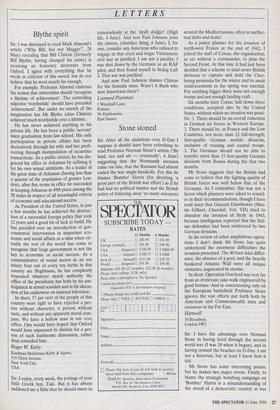Stone stoned
Sir: After all the ululations over D-Day I suppose it should have been refreshing to read Professor Norman Stone's article (By land, sea and air — eventually', 4 June) suggesting that the Normandy invasion came too late, that the Russians had almost ended the war single-handedly. For this he blames 'Bomber' Harris (for diverting 'a good part of the British war effort') as if he had had no political master and the British policy of frittering away `so many resources around the Mediterranean, often in ineffec- tual dribs and drabs'.
As a junior planner for the invasion of north-west France at the end of 1942, 1 joined the staff of Cossac, the organisation, as yet without a commander, to plan the Second Front. At this time it had just been decided that a scheme to land seven British divisions to capture and hold the Cher- bourg peninsula for the winter and to await reinforcements in the spring was suicidal. For anything bigger there were not enough troops and not enough landing craft.
Six months later Cossac laid down three conditions, accepted also by the United States, without which no invasion was possi- ble: 1. There should be an overall reduction in German air forces in Western Europe.
2. There should be, in France and the Low Countries, not more than 12 full-strength, first-quality German mobile divisions, exclusive of training and coastal troops.
3. The Germans should not be able to transfer more than 15 first-quality German divisions from Russia during the first two months.
Mr Stone suggests that the British had come to believe that the fighting quality of British forces was well below that of the Germans. As I remember, this was not a factor which planners were asked to consid- er in their recommendations, though I have read since that General Eisenhower (Mar- tin Gilbert, Churchill, Vol. VII) tried to abandon the invasion of Sicily in 1943, because intelligence reported that the Ital- ian defenders had been reinforced by two German divisions.
In his review of other amphibious opera- tions I don't think Mr Stone has quite understood the enormous difficulties the invasion presented. The 40-foot tidal differ- ence, the absence of a port, and the heavily bunkered Atlantic Wall were all unique obstacles, augmented by storms.
In short, Operation Overlord was very far from an irrelevant cake-walk engineered by good fortune. And in concentrating only on the European battlefield Professor Stone ignores the vast efforts put forth both by American and Commonwealth men and resources in the Far East.
Hartwell
36 Broadway, London SW1


































































 Previous page
Previous page